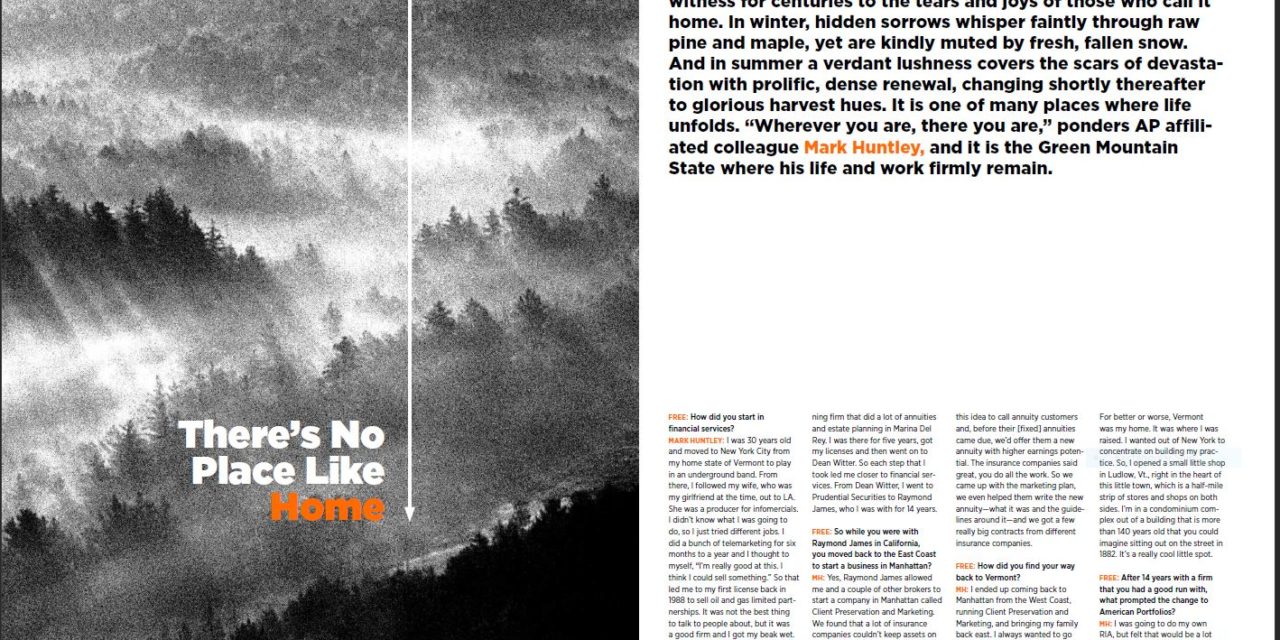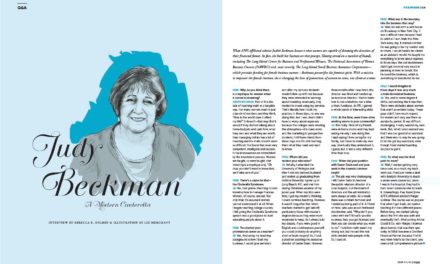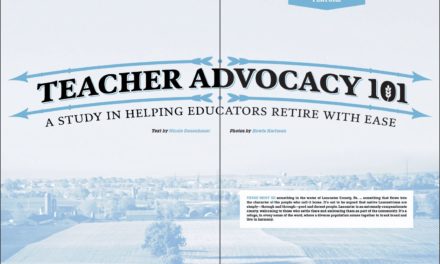
FREE 7.3 Q&A – Mark Huntley
The Green Mountains of Vermont are old and wise, bearing witness for centuries to the tears and joys of those who call it home. In winter, hidden sorrows whisper faintly through raw pine and maple, yet are kindly muted by fresh, fallen snow. And in summer a verdant lushness covers the scars of devastation with prolific, dense renewal, changing shortly thereafter to glorious harvest hues. It is one of many places where life unfolds. “Wherever you are, there you are,” ponders AP affiliated colleague Mark Huntley, and it is the Green Mountain State where his life and work firmly remain.
To view the full article please register below:
FREE 7.3 Q&A – Mark Huntley
There’s no place like home.
The Green Mountains of Vermont are old and wise, bearing witness for centuries to the tears and joys of those who call it home. In winter, hidden sorrows whisper faintly through raw pine and maple, yet are kindly muted by fresh, fallen snow. And in summer a verdant lushness covers the scars of devastation with prolific, dense renewal, changing shortly thereafter to glorious harvest hues. It is one of many places where life unfolds. “Wherever you are, there you are,” ponders AP affiliated colleague Mark Huntley, and it is the Green Mountain State where his life and work firmly remain.
FREE: How did you start in financial services?
Mark Huntley: I was 30 years old and moved to New York City from my home state of Vermont to play in an underground band. From there, I followed my wife, who was my girlfriend at the time, out to LA. She was a producer for infomercials. I didn’t know what I was going to do, so I just tried different jobs. I did a bunch of telemarketing for six months to a year and I thought to myself, “I’m really good at this. I think I could sell something.” So that led me to my first license back in 1988 to sell oil and gas limited partnerships. It was not the best thing to talk to people about, but it was a good firm and I got my beak wet. I went from there to a financial planning firm that did a lot of annuities and estate planning in Marina Del Rey. I was there for five years, got my licenses and then went on to Dean Witter. So each step that I took led me closer to financial services. From Dean Witter, I went to Prudential Securities to Raymond James, who I was with for 14 years.
FREE: So while you were with Raymond James in California, you moved back to the East Coast to start a business in Manhattan?
MH: Yes, Raymond James allowed me and a couple of other brokers to start a company in Manhattan called Client Preservation and Marketing. We found that a lot of insurance companies couldn’t keep assets on their books; so, we came up with this idea to call annuity customers and, before their [fixed] annuities came due, we’d offer them a new annuity with higher earnings potential. The insurance companies said great, you do all the work. So we came up with the marketing plan, we even helped them write the new annuity—what it was and the guidelines around it—and we got a few really big contracts from different insurance companies.
FREE: How did you find your way back to Vermont?
MH: I ended up coming back to Manhattan from the West Coast, running Client Preservation and Marketing, and bringing my family back east. I always wanted to go back to Vermont to raise my family. For better or worse, Vermont was my home. It was where I was raised. I wanted out of New York to concentrate on building my practice. So, I opened a small little shop in Ludlow, Vt., right in the heart of this little town, which is a half-mile strip of stores and shops on both sides. I’m in a condominium complex out of a building that is more than 140 years old that you could imagine sitting out on the street in 1882. It’s a really cool little spot.
FREE: After 14 years with a firm that you had a good run with, what prompted the change to American Portfolios?
MH: I was going to do my own RIA, but felt that would be a lot more work than I wanted; I also felt that I needed a broker/dealer affiliation with more independence—somewhere in between totally being on my own with the RIA, but still being able to go to a national conference to bounce ideas off of other brokers. At Raymond James I had a lot of great relationships: I learned how to be in the business, how to manage portfolios, and how to work with people and with firms. It was the genesis of my career and a big part of why I stayed so long; however, I started researching other firms for about a year and narrowed it down to about five; American Portfolios was among those five.
FREE: What did AP have that other firms didn’t?
MH: Other places were saying, “Oh, we want you, you’re a good producer, you have a clean record and 14 years with Ray James.” They had some really great offers on the table. AP, on the other hand, said “Well, why don’t you come down and talk to us first?” I was thinking to myself, “What?” Yet, there was something intriguing about that … I respected that. They felt I’d be a good fit for them and wanted me to feel they were a good fit for me. The truth is, when I looked at these other offers of 100-percent payouts, by the time they were stripped down and I had what I wanted, it was back down to still losing another 10 or 15 percent. So, to me, it was stepping over dollars to pick up pennies.
FREE: What is your business mix? Do you have a hybrid practice of both transactional and fee-based business?
MH: Yes, I do. I use advisory mostly for the equity portion of my business, which is about 30 to 60 percent in any given portfolio. It’s kind of like four legs of a stool for me: I’ll use a variable annuity with a leveraging benefit; I will use advisory as another leg; and then I will use corporate bonds as a third leg. In most situations I use individual bonds and I get them from either Gates Capital or Pershing; these may be as low as 28 percent or as high as 68 percent of a portfolio. In this third leg, municipal bonds are also used and can be as much as 75 percent for the fixed portion of these bonds. I’ll also get unit investment bond trusts through AAM. Now, the fourth leg, I’ll usually put together my own hedge; for that, I’ll use exchange traded funds, and even a little bit of gold, but it’s my own thing and it will be very light—anywhere from 5 to 8 percent or, at the most, as high as 10 percent.
FREE: What kind of advisory business do you do? Is it self-directed or do you use third-party managers?
MH: I use third-party managers like Genworth and Curian, and I have some that I do myself. The way I look at it, really, is the third-party managers in advisory allow me to have a life. I am entrusting them and I have access to them. These managers do a good job, their reporting is good and my clients are happy. I’m 57 and the reality is what’s left of my life is important. My clients and my practice are important, too, but there’s no reason why I can’t have it all.
FREE: What does it take to be a successful business owner?
MH: I think you’ve got to maintain relationships with your clients, which goes beyond how good their performance has been. You want to be out there in all ways, touching these clients and letting them know that you’re there, even if it’s just a call to say hi. You also need to realize you are expendable, unless you have a stickiness factor to your clients; in order to accomplish that, you’ve got to do a lot of things. For example, I have a radio show. It’s not a call-in program because there are too many things that could go sideways. The idea behind it is, get my number and I’d love to talk to you about some of the things that were covered in the show. I do it every Monday and I’ve gained a tremendous amount of credibility.
FREE: How have you, your clients and Vermont, for that matter, fared through the market and economic crisis these last five years?
MH: I think this was a really good year, but we fall in line with a lot of other states in the country as far as real estate and overcoming some of the economic challenges of these last several years. We also had [Hurricane] Irene to contend. That just literally ripped this state. Just when we were coming back from the economy we got socked again. It wiped out everything: businesses, infrastructures, beautiful streams filled with trout. But the state came back really fast through the help of the old Vermont, New Englander work ethic. The beautiful part about America is that we move on.
FREE: These life crises are easier said than done, aren’t they?
MH: My entire life changed about a year-and-a-half ago when my son Spencer was killed by a Mack truck—my only son. [APFS CEO] Lon Dolber and AP were rock solid behind me—anything I needed. They were very generous to my son’s memorial fund, which I set up to help musicians who need recording help or instruments1. AP gave me the time I needed to heal. It was a life changer of life changes.
FREE: I can only imagine.
MH: It upsets the natural order. It’s the stuff that people talk about— the pinnacle of grief. But you know something? On my phone, the day that he died, I had something that read, “Be kind. Everybody you meet carries a great burden.” It is something I’ll live by my whole life. It’s as if to say, don’t bust somebody because they are carrying stuff you’ll never know about; try to show some compassion and some sympathy.
FREE: So how did you work through this in the days and weeks that followed?
MH: I was on the radio the next day, after he died and mind you, it was not an easy radio show. I broke down a couple of times during it, but I told them I started a foundation and that I believed in moving forward and I know my son. That was the hardest thing I’ve ever done in my life. I see the walk, I hear people say, “I lost my son, I lost my mom…” I’m telling you, it’s a walk and a club you don’t want to belong to.
FREE: How are you doing now?
MH: I feel stronger now than I did a year and a half ago. It doesn’t go away. It just becomes part of who you are. I do have Madi, my 17-yearold daughter—Spencer’s sister; she’s an amazing athlete and a beautiful girl. She’s pretty much my whole life as you can imagine. But everybody you meet carries a great burden and we are responsible as stewards of our friends and family and our lives to take care of each other.
FREE: You have a history of being very civic minded. Is there anything or anyone in particular that drew you to public service?
MH: I probably got involved initially because of my kids. It was a small town and my kids were in a small school. That grew to Rotary, Chamber of Commerce, Civil Authority, Select Board and the school board for 10 years. It’s volunteering. I’ve enjoyed the camaraderie and the fellowship of Rotary in helping people. And so one thing led to another and I found that the more I did it, the more I enjoyed it.
FREE: And that is ultimately what led to you running for and being elected to Vermont’s House of Representatives?
MH: I just felt that it was a natural path. I had been on the Select Board in my town and on the school board. I enjoyed the work and somebody who had been in the Statehouse for 10 years had seen the work I had done locally. He called me up and he said, “I’m going to retire. I’ve been here 10 years and that’s long enough.” That’s how it started.
FREE: So your term ends in 2014?
MH: Yes, it does. The term this year was from Jan. 12 to May 12; it’s about four months, and then I’ll be back again in January.
FREE: Were you pleased with the outcome and what you accomplished?
MH: When you get up there you’re placed in a committee. I chose water resources, which became, after Irene, a very hot area. There were almost 1,000 bills and 60 were passed; our committee got five of those to the floor. It was an amazing process. When it came down to the last day, 11 at night, there was still voting on the budget and it went down from 130 in favor to six opposed. That is magnificent. That means everybody is on the same page. To be sitting in the house when that happened, to know that the session closed out that way, was really cool. I really felt like I was a part of something.
FREE: How does one manage their personal and professional obligations while serving in office?
MH: There’s no way around that. It’s hard. After Spencer died, I said to myself, “It’s a walk I walk every day.” I carry him with me on my shoulders. Then there are the commitments to my community, my commitment to the Statehouse— even when I’m not there—and my practice. I’m like that guy on the Ed Sullivan Show with the spinning plates. But seriously, I do also have a really great support system. My personal assistant, Sarah Furrer, is the lifeblood of my practice and a key part of my ability to serve both my clients and in the Statehouse. Colleague Bob Clayton, who works at the home office, was also key in enabling me to fulfill my civic calling; he more than stepped up to be on call in the event of any client issues.
FREE: Where do you see the future in financial services for investment professionals like yourself?
MH: The environment is changing, but the thing that’s great about being a financial planner is you’re a coach. You have to make it very clear—not arrogantly—that there’s a reason you’re here. You may be expendable, like I said, but the reality is over time, if you do your work, you will always learn something— all the new things that are happening—that make it so you’re important. You have to know what you’re doing, you have to be proactive versus reactive—I think we saw that in 2008—and you have to really know your client nowadays. I think a lot of newer activities in our business will be in social media. Changes are going to happen with investments and I think that having more scrutiny from a client’s point of view is imperative to being able to make sure that we do the job we’re supposed to. As independents, we’re unique and special and we have to look at ourselves that way.
FREE: What social and/or economic issues concern you the most?
MH: Health care is really important to me. As far as any kind of major economic issues, I’m like most brokers. I pray the economy improves and I pray those numbers are real. I’m cautiously optimistic, even though I hate that saying. Here in Vermont, one of the things that I’ll be looking at closely has to do with texting and driving, which is how my son died. This is a problem all across the country—it really is. It’s going to kill more people than drunk driving and opiates. It’s distracted driving. Is that a personal thing for me? Hell yeah, because of my son. He looked down at his phone, switching tunes for about three seconds, and everybody’s life changed. That’s what I’m working on with a team of people and the Statehouse.
FREE: You mentioned earlier that you played in a band. What instrument do you play?
MH: I play a little bass, I play some guitar, I’m a lead singer and I write; primarily, in most bands, I’ve always been the drummer and usually the lead singer. Music is absolutely the most healing thing I do. Without it, I don’t know how I would have gotten through the past year-and-a-half. That was the common thread with my son. He was a really good guitar player and I’m not just saying that because he was my son. He was better than all of the kids in this area and he was looked up to quite a bit. He was an amazing drummer, too; a great musician.
FREE: The motto for Ludlow, Vt., is: “A great place to live, work and play.” Is that true?
MH: It’s not perfect but, you know, you have that everywhere. I sat out this morning with my coffee on my deck overlooking the entire Ascutney mountain range. It is very beautiful when the mountains fill up after a long winter with lots of snow. It’s like a giant comforter. I sit there smoking my cigar, contemplating the universe and it doesn’t suck. Like I said, wherever you are, there you are.
FREE: Thank you for sharing your life and your work with our readers.
MH: Thank you.












